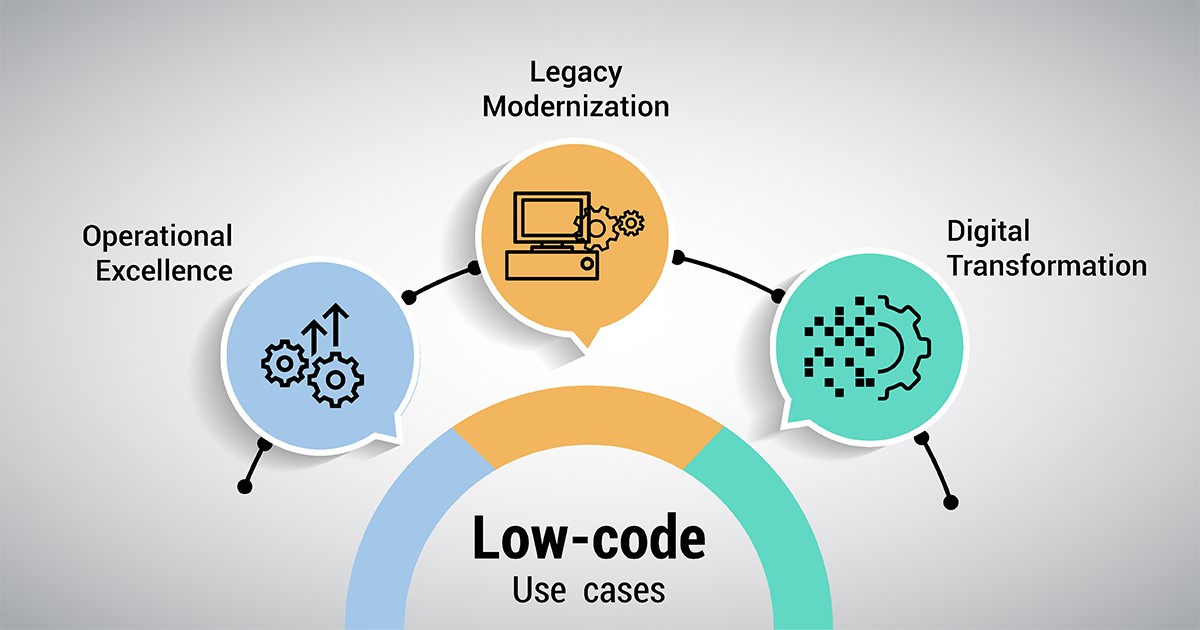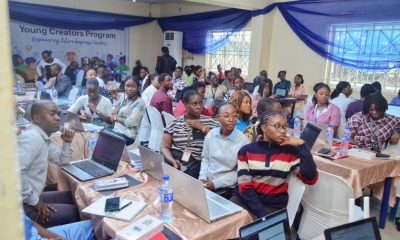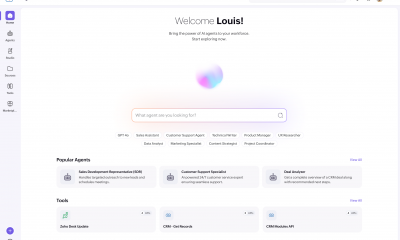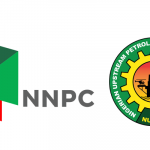Technology
The Future of IT: Democratising Application Development with Low-code Platforms

By Hyther Nizam
With COVID-19 accelerating the digital transformation of businesses, many organisations were forced to adopt a work-from-home strategy, and customers began to increasingly purchase goods and services online. The outbreak highlighted the critical nature of software and its impact on people’s lives, both professionally and personally.
At the same time, the function of the IT department has evolved and it has been crucial in supporting organisations in shifting to a new way of working. While numerous departments have seen budget cuts, many businesses have increased their IT spending. This is because the department, now expected to complete more tasks more quickly, is vital to the success of a business.
The rise of low-code app development platforms
To accommodate the unexpected change in business, working apps and systems had to be developed and deployed in the shortest period possible. With IT departments now playing such a critical role in strategic business development, the evolution of low-code and no-code (L/N) has helped to lighten the IT load for businesses of all sizes. According to Gartner, low code applications will account for more than 65% of all app development functions by 2024, with 66% of large organisations adopting at least four low-code platforms.
L/N development platforms allow for the rapid development of comprehensive technological solutions without the need for extensive programming skills. This makes life easier for business users, analysts, sales and marketing executives. In other words, those who are closest to the requirement and issue at hand are contextually more informed.
South African businesses that use low-code and no-code software benefit from the following:
Reduce the time it takes to develop and deploy innovative apps.
Reduce the strain on professional developers by ensuring that all business requirements are met while adhering to regulatory criteria for development methods and components.
Allow business users to give shape to their innovative and practical solutions without having to specialise in specific programming languages.
Bring together business and IT teams. Business developers can create applications within the constraints imposed by IT specialists. A centralised, simple-to-use development platform also enables the IT staff to monitor the development process and intervene as necessary. A New Jersey managed services provider can facilitate this collaboration by offering the tools and support needed to streamline development and ensure compliance.
Low-code platforms also help address the challenges posed by ‘Shadow IT’ or ‘Rogue IT’ practices, which often happens when business teams or individuals start using different tools to solve their problems without keeping their IT teams in the loop.
IT possibilities enabled by low-code platforms
Recently, businesses have successfully launched two types of apps employing the low-code application development paradigm, with some focusing completely on solutions as part of their pivotal strategies in the face of the pandemic.
Internal apps: Current conditions have sparked a rise in internal collaboration apps such as contact tracing, virtual check-in portals for remote employees, and COVID-19 live dashboards to name a few. From employee management to streamlining operations with automated approval processes, low-code platforms have played a vital role in allowing different types of users to ship critical solutions for automation, connectivity and communication, allowing thousands of employees to take their work home with them and for businesses to continue as usual with minimal disruptions. This is further enabled by the ability of modern low-code platforms to integrate with legacy systems and processes, allowing for web and mobile apps with seamless user experiences that can push and pull information from existing internal systems.
Customer-facing apps: Post lockdown announcements during the first wave of the pandemic, many businesses quickly rolled out self-service web portals and mobile apps, and extended their products and services to their customers digitally. For instance, a number of banks launched digital solutions for banking, loans, forex etc. Even the large, well-established banks that witness stiff competition from fintechs and neobanks (who are technically more flexible and savvy) are now able to compete successfully with the latter, thanks to low-code application platforms.
The potential for simpler business process automation, unencumbered by complex code structures or delivery delays, makes L/N platforms a strategic asset for any company. Not to mention the fact that we now have AI-assisted L/N platforms that can provide guided experience for non-programmers, assisting them in developing better applications through intelligent suggestions.
All things considered, low-code and no-code solutions will give businesses the freedom they have always needed to achieve true agility and innovation.
Hyther Nizam heads Zoho’s Middle East & Africa (MEA) operations and also leads some of the technology initiatives in Zoho which includes Zoho’s scripting language, Deluge
Technology
Leticia Otomewo Becomes Secure Electronic Technology’s Acting Secretary

By Aduragbemi Omiyale
One of the players in the Nigerian gaming industry, Secure Electronic Technology (SET) Plc, has appointed Ms Leticia Otomewo as its acting secretary.
This followed the expiration of the company’s service contract with the former occupier of the seat, Ms Irene Attoe, on January 31, 2026.
A statement to the Nigerian Exchange (NGX) Limited on Thursday said Ms Otomewo would remain the organisation’s scribe in an acting capacity, pending the ratification and appointment of a substantive company secretary at the next board meeting.
She was described in the notice signed by the Managing Director of the firm, Mr Oyeyemi Olusoji, as “a results-driven executive with 22 years of experience in driving business growth, leading high-performing teams, and delivering innovative solutions.”
The acting secretary is also said to be “a collaborative leader with a passion for mentoring and developing talent.”
“The company assures the investing public that all Company Secretariat responsibilities and regulatory obligations will continue to be discharged in full compliance with the Companies and Allied Matters Act, applicable regulations, and the Nigerian Exchange Limited Listing Rules,” the disclosure assured.
Meanwhile, the board thanked Ms Attoe “for professionalism and contributions to the Company during the period of her engagement and wishes her well in her future endeavours.”
Technology
Russia Blocks WhatsApp Messaging Service

By Adedapo Adesanya
The Russian government on Thursday confirmed it has blocked the WhatsApp messaging service, as it moves to further control information flow in the country.
It urged Russians to use a new state-backed platform called Max instead of the Meta-owned service.
WhatsApp issued a statement earlier saying Russia had attempted to “fully block” its messaging service in the country to force people toward Max, which it described as a “surveillance app.”
“Today the Russian government attempted to fully block WhatsApp in an effort to drive people to a state-owned surveillance app,” WhatsApp posted on social media platform X.
“Trying to isolate over 100 million users from private and secure communication is a backwards step and can only lead to less safety for people in Russia,” it said, adding: “We continue to do everything we can to keep users connected.”
Russia’s latest move against social media platforms and messaging services like WhatsApp, Signal and Telegram comes amid a wider attempt to drive users toward domestic and more easily controlled and monitored services, such as Max.
Russia’s telecoms watchdog, Roskomnadzor, has accused messaging apps Telegram and WhatsApp of failing to comply with Russian legislation requiring companies to store Russian users’ data inside the country, and of failing to introduce measures to stop their platforms from being used for allegedly criminal or terrorist purposes.
It has used this as a basis for slowing down or blocking their operations, with restrictions coming into force since last year.
For Telegram, it may be next, but so far the Russian government has been admittedly slowing down its operations “due to the fact that the company isn’t complying with the requirements of Russian legislation.”
The chat service, founded by Russian developers but headquartered in Dubai, has been a principal target for Roskomnadzor’s scrutiny and increasing restrictions, with users reporting sluggish performance on the app since January.
Technology
Nigerian AI Startup Decide Ranks Fourth Globally for Spreadsheet Accuracy

By Adedapo Adesanya
Nigerian startup, Decide, has emerged as the fourth most accurate Artificial Intelligence (AI) agent for spreadsheet tasks globally, according to results from SpreadsheetBench, a widely referenced benchmark for evaluating AI performance on real-world spreadsheet problems.
According to the founder, Mr Abiodun Adetona, the ranking places Decide alongside well-funded global AI startups, including Microsoft, OpenAI, and Anthropic.
Mr Adetona, an ex-Flutterwave developer, also revealed that Decide now has over 3,000 users, including some who are paying customers, a signal to the ability of the startup to scale in the near future.
SpreadsheetBench is a comprehensive evaluation framework designed to push Large Language Models (LLMs) to their limits in understanding and manipulating spreadsheet data. While many benchmarks focus on simple table QA, SpreadsheetBench treats a spreadsheet as a complex ecosystem involving spatial layouts, formulas, and multi-step reasoning. So far, only three agents rank higher than Decide, namely Nobie Agent, Shortcut.ai, and Qingqiu Agent.
Mr Adetona said SpreadsheetBench measures how well AI agents can handle practical spreadsheet tasks such as writing formulas, cleaning messy data, working across multiple sheets, and reasoning through complex Excel workflows. Decide recorded an 82.5% accuracy score, solving 330 out of 400 verified tasks.
“The result reflects sustained investment in applied research, product iteration, and learning from real-world spreadsheet workloads across a wide range of use cases,” Mr Adetona told Business Post.
For Mr Adetona, who built Decide out of frustration with how much time professionals spend manually cleaning data, debugging formulas, and moving between sheets, “This milestone highlights how focused engineering and domain-specific AI development can deliver frontier-level performance outside of large research organisations. By concentrating on practical business data problems and building systems grounded in real user environments, we believe smaller teams can contribute meaningfully to advancing applied AI.”
“For Decide, this is a foundation for continued progress in intelligent spreadsheet and analytics automation,” he added.
-

 Feature/OPED6 years ago
Feature/OPED6 years agoDavos was Different this year
-
Travel/Tourism10 years ago
Lagos Seals Western Lodge Hotel In Ikorodu
-

 Showbiz3 years ago
Showbiz3 years agoEstranged Lover Releases Videos of Empress Njamah Bathing
-

 Banking8 years ago
Banking8 years agoSort Codes of GTBank Branches in Nigeria
-

 Economy3 years ago
Economy3 years agoSubsidy Removal: CNG at N130 Per Litre Cheaper Than Petrol—IPMAN
-

 Banking3 years ago
Banking3 years agoSort Codes of UBA Branches in Nigeria
-

 Banking3 years ago
Banking3 years agoFirst Bank Announces Planned Downtime
-

 Sports3 years ago
Sports3 years agoHighest Paid Nigerian Footballer – How Much Do Nigerian Footballers Earn






















